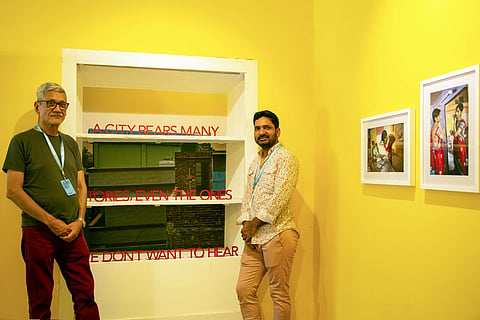
- LIFESTYLE
- FASHION
- FOOD
- ENTERTAINMENT
- EVENTS
- CULTURE
- VIDEOS
- WEB STORIES
- GALLERIES
- GADGETS
- CAR & BIKE
- SOCIETY
- TRAVEL
- NORTH EAST
- INDULGE CONNECT

At the Kochi-Muziris Biennale 2018, Sunil Gupta and Charan Singh present the photographic installation, Dissent and Desire, while initiating a gathering place for relevant discussions.
Barely a few months after homosexuality was decriminalised in India with the overturning of Section 377, the show presents portraits and videos of members of the LGBTQ community, presented on walls painted in bright yellow to resemble the artists’ living rooms. Gupta emphasises that while Section 377 decriminalised what the law considers ‘private’ acts, this project is a ‘queer act of resistance’ where storytelling and sharing become a viable force for change. Excerpts from an interview:
What is the larger role of art at the Kochi Muziris Biennale?
It is to pose serious questions and begin questions about the future of humanity.
What topics of discussion are you looking forward to engage with?
We are looking forward to learning more about the hidden histories of people and artists who are normally not allowed to have a platform to express their stories and relate their experiences. Globally that has meant women, people of colour, queer people and in India, people not from the elite.
How do you envision various streams of art coming together — from visual arts to installations, performance and video? How will this open up the art from inside white cube galleries to more accessible platforms?
The practices of fine art encompass all of the above in your list, and the curator has selected each contribution very carefully, so they resonate with each other. Artists not usually seen together are in juxtaposition in various ways.
The venues being used by the Biennale are very accessible to the town and not hidden away in elite white cube spaces.
For instance, our collaborative work is being exhibited in a period house, Kashi Town House, and we tried to keep its original features and adapt our work, which changes the viewers’ experience from an encounter in a white cube environment.
Aside from the free days, the overall price of a daily ticket is INR 100, which is reasonably low. And, every evening, we congregate at the Pavilion, a public space designed to encourage conversations.
What are your own expectations from the project, and the festival?
We came to find most of our work already installed according to our instructions, so we spent our time fine-tuning the install and then spending time with other installations at the Biennale.
We met some old friends, collaborators and former students and interns, and had a chance to connect with our global fraternity in a way that is not often possible.
Our project foregrounds the ordinary everyday lives of queer people in India, despite the ups and downs of Section 377, and the general lack of acceptance from society.
We feel our story needs to be seen and heard by the widest number of people in India, and this Biennale is a good place to start.
Do you believe it is necessary that contemporary art must be political, or activistic in nature, to make a seemingly greater impact?
We don’t think art exists to make an impact, we feel art is there to pose serious and difficult questions about ourselves, our morality, and our future. It’s not simply about making politics and activism.
Does it ever seem to you that the new social media-driven, hyper video-consuming generation often seems disinterested in anything to do with art?
No, because their world is completely driven by images and sound, both media are deeply rooted in the practices of art making, so they are hardly divorced from it.
How would you like to get people to take an added moment, to make their own opinions, and enjoy the art for themselves?
People need to look away from their screens, and spend some time to look art and enjoy its materiality, and image, and to allow themselves to be moved by it.
The show Dissent and Desire is on display at Kashi Town House until March 29, 2019.
— Jaideep Sen
jaideep@newindianexpress.com
@senstays